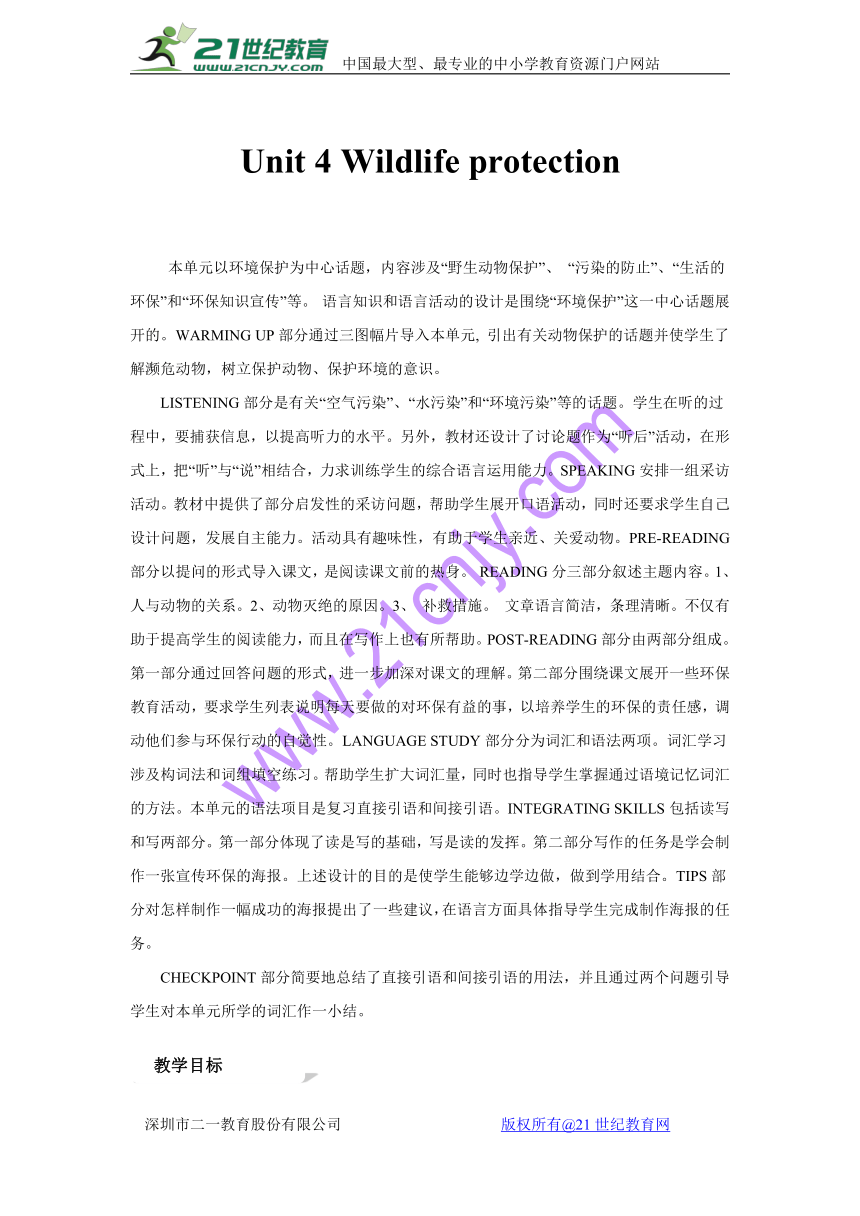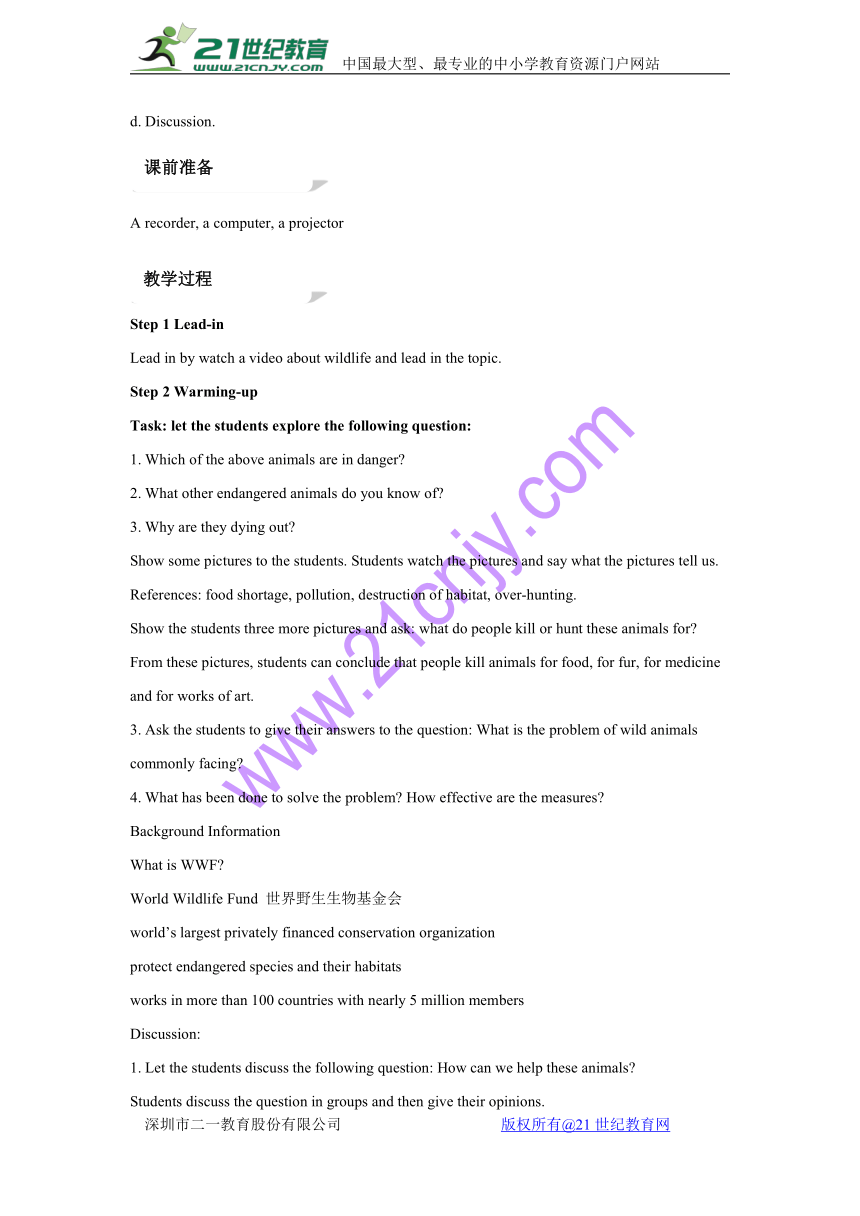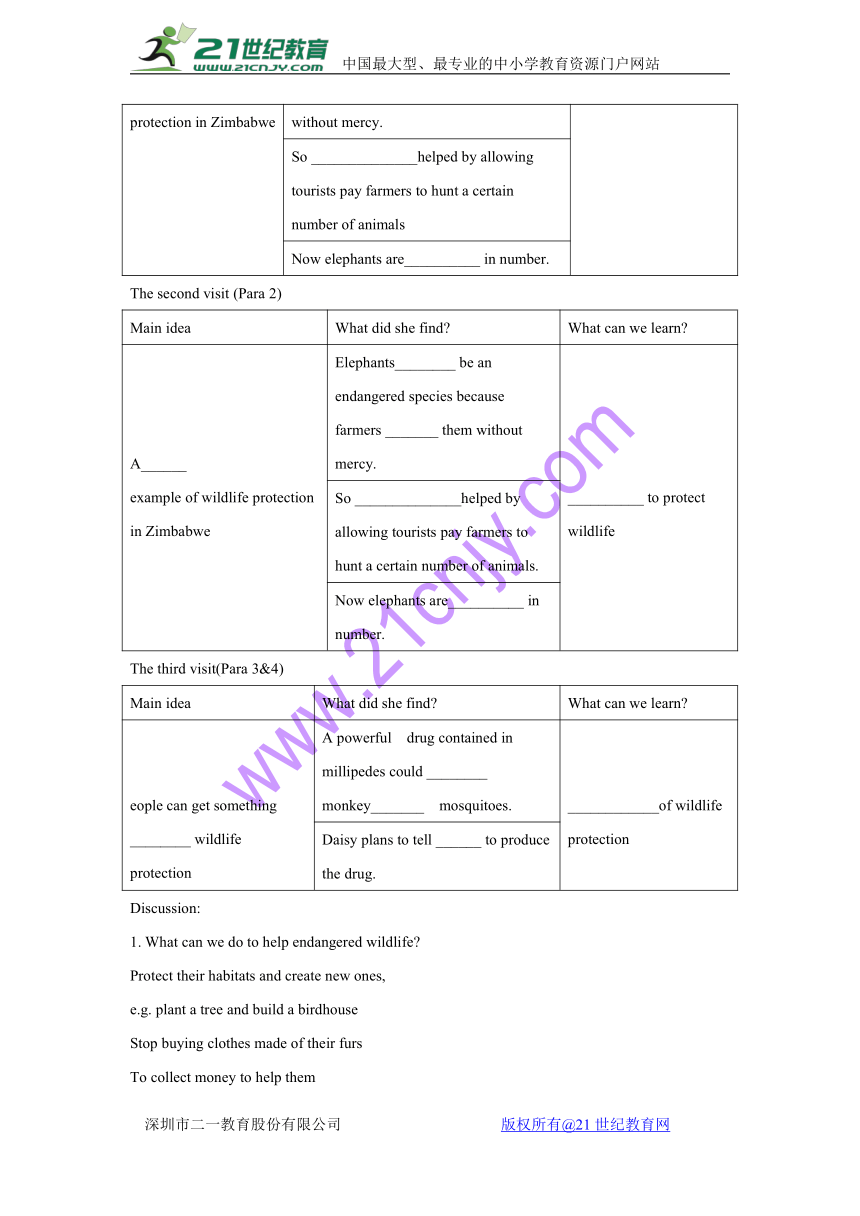人教 新课标必修二英语Unit 4 Wildlife protection【教学设计】
文档属性
| 名称 | 人教 新课标必修二英语Unit 4 Wildlife protection【教学设计】 |

|
|
| 格式 | zip | ||
| 文件大小 | 136.6KB | ||
| 资源类型 | 教案 | ||
| 版本资源 | 人教版(新课程标准) | ||
| 科目 | 英语 | ||
| 更新时间 | 2018-01-11 00:00:00 | ||
图片预览





文档简介
Unit 4 Wildlife protection
本单元以环境保护为中心话题,内容涉及“野生动物保护”、 “污染的防止”、“生活的环保”和“环保知识宣传”等。 语言知识和语言活动的设计是围绕“环境保护”这一中心话题展开的。WARMING UP部分通过三图幅片导入本单元, 引出有关动物保护的话题并使学生了解濒危动物,树立保护动物、保护环境的意识。
LISTENING部分是有关“空气污染”、“水污染”和“环境污染”等的话题。学生在听的过程中,要捕获信息,以提高听力的水平。另外,教材还设计了讨论题作为“听后”活动,在形式上,把“听”与“说”相结合,力求训练学生的综合语言运用能力。SPEAKING安排一组采访活动。教材中提供了部分启发性的采访问题,帮助学生展开口语活动,同时还要求学生自己设计问题,发展自主能力。活动具有趣味性,有助于学生亲近、关爱动物。PRE-READING部分以提问的形式导入课文,是阅读课文前的热身。 READING分三部分叙述主题内容。1、人与动物的关系。2、动物灭绝的原因。3、 补救措施。 文章语言简洁,条理清晰。不仅有助于提高学生的阅读能力,而且在写作上也有所帮助。POST-READING部分由两部分组成。第一部分通过回答问题的形式,进一步加深对课文的理解。第二部分围绕课文展开一些环保教育活动,要求学生列表说明每天要做的对环保有益的事,以培养学生的环保的责任感,调动他们参与环保行动的自觉性。LANGUAGE STUDY部分分为词汇和语法两项。词汇学习涉及构词法和词组填空练习。帮助学生扩大词汇量,同时也指导学生掌握通过语境记忆词汇的方法。本单元的语法项目是复习直接引语和间接引语。INTEGRATING SKILLS包括读写和写两部分。第一部分体现了读是写的基础,写是读的发挥。第二部分写作的任务是学会制作一张宣传环保的海报。上述设计的目的是使学生能够边学边做,做到学用结合。TIPS部分对怎样制作一幅成功的海报提出了一些建议,在语言方面具体指导学生完成制作海报的任务。
CHECKPOINT部分简要地总结了直接引语和间接引语的用法,并且通过两个问题引导学生对本单元所学的词汇作一小结。
1.Target language 目标语言
a Key words and expressions:
protection decrease relief reserve respond laughter mercy contain employ incident contain fierce
die out, in relief, burst into laughter, pay attention to, come into being ,according to
b Key sentences重点句子:
1)I wonder what is being done to help you.
2)You should pay attention to the rainforest where I live and appreciate how the animals live together.
2. Ability goals 能力目标
a. Talk about wildlife protection
b. Enable the Ss to get the main idea of the text.
c. Understand the text and answer the questions.
d. Enable the Ss to understand the details about the passage, choosing the correct answer according the text.
3. Learning ability goals 学能目标
a. Encourage Ss to think and express their attitude towards the wildlife and the wildlife protection.
b. Let the Ss know how to get the main idea of the text.
c. Get the Ss to learn how to find the relative key words from the passage to choose the correct answers.
d. Talk about the measures to protect the wildlife.
a. Enable the students to know some basic information about the endangered animals and wildlife protection.
b. Encourage Ss to think and express their attitude towards the wildlife and the wildlife protection.
a. Skimming and scanning
b. Asking-and-answering activity to check the Ss’ understanding of the text.
c. Individual, pair or group work to finish each task.
d. Discussion.
A recorder, a computer, a projector
Step 1 Lead-in
Lead in by watch a video about wildlife and lead in the topic.
Step 2 Warming-up
Task: let the students explore the following question:
1. Which of the above animals are in danger?
2. What other endangered animals do you know of?
3. Why are they dying out?
Show some pictures to the students. Students watch the pictures and say what the pictures tell us.
References: food shortage, pollution, destruction of habitat, over-hunting.
Show the students three more pictures and ask: what do people kill or hunt these animals for?
From these pictures, students can conclude that people kill animals for food, for fur, for medicine and for works of art.
3. Ask the students to give their answers to the question: What is the problem of wild animals commonly facing?
4. What has been done to solve the problem? How effective are the measures?
Background Information
What is WWF?
World Wildlife Fund 世界野生生物基金会
world’s largest privately financed conservation organizationwww.21-cn-jy.com
protect endangered species and their habitats
works in more than 100 countries with nearly 5 million members
Discussion:
1. Let the students discuss the following question: How can we help these animals?
Students discuss the question in groups and then give their opinions.
2. After discussion, tell students what is wildlife protection about.
Step 3 Reading
Fast reading
What do they mainly talk about?
The passage is mainly about _____.
A. some protection of wildlife
B. a journey of a flying carpet
C. daisy’s wonderful experience with some animals
2. Decide the sentences are True or False.
Daisy saw many antelopes in Tibet.
Daisy’s sweater was made of sheep wool.
The antelopes were an endangered species.
The elephant used to be well protected in Zimbabwe.
In Zimbabwe, tourists love to see the elephants.
The farmers in Zimbabwe get nothing from the elephants now.
This is a real story in Daisy’s life.
3. Read and complete the chart.
Animal
Where
What did she find?
How did she feel?
antelopes
elephant
monkey
Careful Reading
Let the students read the text carefully to find out more details about Daisy’s journey. Before reading each paragraph, show them tasks.【来源:21·世纪·教育·网】
Fill in the blanks.
The first visit (Para 1)
Main idea
What did she find?
What can we learn?
A______
example of wildlife protection in Zimbabwe
Elephants________ be an endangered species because farmers _______ them without mercy.
__________ to protect wildlife
So ______________helped by allowing tourists pay farmers to hunt a certain number of animals
Now elephants are__________ in number.
The second visit (Para 2)
Main idea
What did she find?
What can we learn?
A______
example of wildlife protection in Zimbabwe
Elephants________ be an endangered species because farmers _______ them without mercy.
__________ to protect wildlife
So ______________helped by allowing tourists pay farmers to hunt a certain number of animals.
Now elephants are__________ in number.
The third visit(Para 3&4)
Main idea
What did she find?
What can we learn?
eople can get something
________ wildlife protection
A powerful drug contained in millipedes could ________ monkey_______ mosquitoes.
____________of wildlife protection
Daisy plans to tell ______ to produce the drug.
Discussion:
1. What can we do to help endangered wildlife?
Protect their habitats and create new ones,
e.g. plant a tree and build a birdhouse
Stop buying clothes made of their furs
To collect money to help them
Tell people around you the importance of wildlife protection and call for people to protect wildlife…21·世纪*教育网
2. Choose one animal and talk about its lifestyle and problems. Why is it endangered? What might people do to save it?www-2-1-cnjy-com
3. Write a letter to WWF based on what you have discussed, asking them to help you save your endangered animal.【来源:21cnj*y.co*m】
The World Wide Fund for Nature (WWF) is an international non-governmental organization working on issues regarding the conservation, research and restoration of the environment.
It is the world’s largest independent conservation organization with over 5 million supporters worldwide, working in more than 90 countries. It is a charity.【版权所有:21教育】
Post reading
According to the text, make a dialogue between Daisy and Antelope / Elephant / Monkey.
Step 4 Language points
decrease v. 减少;降低
The number of new students decreased from 210 to 160 this year.
They are making every effort to decrease the production cost.
decrease … by表示数量减少的幅度,
即在原有的基础上“增加或减少了多少”;
decrease … to则表示“减少到多少”。
e.g. 该城市去年交通事故减少了30%。
The traffic accidents in the city __________ 30% last year.
人口去年减少到1百万。
The population ____________ 1 million last year.
decrease, diminish, lessen, reduce, 这些词的共同含义是“减少,变少”。
decrease: 指逐渐地、不断地减少。
diminish: 侧重大小、数量和重要性的不断减小,强调减小的部分。
lessen: 普通用词,与decrease近义。指数目、程度、价值、实力等的减少。
reduce: 普通用词,含义广。指数量、程度的降低或减少。
2. die out 灭亡;逐渐消失
Many old customs have died out.
No one have come up with a convincing explanation of why dinosaurs have died out.
He is the last of the family; after his death the name will die out.
die of 死于 …
die from 死于…
die down 渐渐消失,平息,变弱
die away 渐熄,减弱,消失
die off 相继死亡,先后死去
die for 为了 ... 而死,渴望
Elephants would ______ if men were allowed to shoot as many as they wished.
A. die down B. die out C. die away D. die off
答案:B
解析:die away 指“(声音、风、光线等)渐息,渐弱”; die down 指“(慢慢)熄灭,平静下来”; die off 指“一个一个地死去”; die out 指“(家族、种族、习俗、观念等)灭绝,绝迹”。
3. hunt v. 打猎;猎取;搜寻
November is a good time to hunt deer.
We’ll go hunting in the afternoon.
Winter is the best time for hunting in mountain areas.
John set out that day to hunt for work.
hunt for 搜寻
hunt n. 打猎;猎取;搜寻
The tiger hunt began at sunrise.
The hunt for the lost child continued until she was found. 2·1·c·n·j·y
I am on the hunt for the perfect summer sandals.
hunter n. 猎人
4. in peace 平静地,处于平静状态
All the villagers live together in peace.
Please let me do my work in peace.
The two communities live together in peace (with one another).
类似短语:in surprise 惊奇地
in rags 衣衫褴楼地
in tears 流着泪;哭
in danger of 有 ... 的危险
The house is now in danger of collapse.
He was in danger of losing his life.
in danger 处于危险中
The girl’s life was obviously in immediate danger. 21*cnjy*com
You are so kind-hearted that you always give me a hand when I am in danger.
be out of danger 脱离危险
endangered adj. 濒危的
dangerous adj. 危险的
你认为中国的熊猫正处在危险中吗? (in danger)
Do you think the pandas in China are in danger?
It is reported that ________ mountain lion is in ________ danger of dying out.
解析:the; /.
5. long 在这里是动词,意思是“渴望,热望,极想”。
He longs for / after fame.
She longed to be back in China.
She longed for her son to return home.
6. respond v. 回答;响应;做出反应
Has she responded to your letter?
I invited her to dinner but she did not respond.
The patient is responding well to treatment.
response n. 反应;回答;响应;答复
— It is strange that Dave didn’t respond
_____ any of my emails.
— Something must have happened to him.
A. on B. with C. for D. to
answer, reply, respond这些动词均有“回答”之意。
answer: 常用词,指用书面、口头或行动对他人的请求、询问、质问等作出回答或反应。
reply: 较正式用词,较少用于口语。侧重经过考虑的较正式答复。
respond: 正式用词,指即刻的、以口头或行动对外来的号召、请求或刺激等作出回答或响应。
7. relief n. (痛苦,负担等的) 缓和,减轻;解除
The pills gave her some relief.
It is a great relief to have rain after a long time of drought.【出处:21教育名师】
To our great relief, all the children arrived home, safe and sound.
in relief 如释重负;松了一口气
He said and then smiled in relief.
to one’s relief 使某人松了一口气
To my great relief / Much to my relief, he is safe now.
When the woman saw that her son was OK after the car accident, she said ______, “Well, dear, you are the most important for me, not the expensive car.”
A. in peace B. in danger C. in surprise D. in relief 21教育网
答案:D
8. burst into 闯入,突然发作
She burst into the room , and immediately started talking to everyone.
When she saw me she burst into tears.
When he finished the speech, the audience burst into applause.
大家看到他摔下楼梯哄堂大笑。
They burst(ed) into laughter seeing him fall down the stairs.
burst in 打断
burst out 大声喊叫;闯出
burst upon (思想) 突然出现
burst open 猛然打开
9. without mercy残忍地
mercy n.宽容,宽恕,怜悯, 善行,仁慈行为
have mercy on/upon sth.对…有怜悯之心
show mercy to 向…表示怜悯
at the mercy of 受...的支配,在...的掌握中
10. certain adj. 某种(或一定)程度的;确定的
For certain reasons I will be unable to attend the meeting.
I can’t say for certain when he will arrive.
They are certain to succeed.
=They are certain of success.
=They are certain that they will succeed.
=It’s certain that they will succeed.
be certain of 确信…
for certain 肯定地
make certain 弄清楚
make certain of 确定(弄清楚;弄确实)…
11. protect … from 保护…不受…(危害)
May God protect you from harm.
Wearing dark glasses can protect your eyes from the sun. 2-1-c-n-j-y
prevent / stop / keep … from doing sth.
阻止...做...
12. contain v. 包含,容纳;容忍;克制
This book contains all the information you need.
This drink doesn’t contain any alcohol.
Try to contain your anger.
contain one’s anger/grief/ feelings 克制愤怒
contain oneself 克制自己
contain, include, involve, hold这些动词均含有“包括,包含”之意。
contain: 普通用词,所涉及的物体常常是其组成部分或内容,强调包容关系,既可指具体有形的东西,也可指抽象无形的东西。21教育名师原创作品
include: 普通用词,指一整体包含着各独立的部分,也指某东西包含另一东西的某一部分。
involve: 指包含因整体的性质决定的成分或结果。所包括的往往是无形的、不可触知的东西,多用作引申。
13. hold: 常和contain换用,指能够容纳或有足够的容纳量,强调包容能力。
affect v. 影响;感动;侵袭
The climate affected his health.
The amount of rain affects the growth of crops.
He was much affected by the sad news.
affected受到影响的,感动的
affection喜爱,感情,影响
affect, influence, impress这些动词均含“影响”之意。
affect: 通常是物而不是人作主语,主要指一时的影响,着重影响的动作,可指一般意义的影响(不分好坏),也可指不良影响。
influence: 侧重在思想、性格、行为等方面所产生的潜移默化的影响,也可指自然力的影响。
impress: 强调影响既深刻又持久。
14. pay attention to 注意;留意 (to 是介词)
You should pay attention to your spelling.
The teacher required the students to pay more attention to keeping? the lab clean.
devote one’s time to doing sth.
把某人的时间用于(奉献于) 做某事
be / get used to doing sth. 习惯于做某事
be accustomed to doing sth. 习惯于做某事
look forward to doing sth. 盼望做某事
be opposed to doing sth. 反对做某事
object to doing sth. 反对做某事
stick to doing sth. 坚持做某事
get down to doing sth. 开始做某事
15. appreciate v. 欣赏,赏识;领会;感激,后跟n,v-ing, that从句
Her talent for music was not appreciated.
I am afraid you have not appreciated the urgency of the matter. 21cnjy.com
He appreciates being invited.
They deeply appreciated his kindness.
*appreciate后面一般接物做宾语,不接人做宾语
I (would) appreciate it if...如果...我将不甚感激。。。
I would appreciate it if you could help me.
appreciation n.欣赏,鉴定,感谢
in appreciation of 作为对...的感谢,为感谢...
He was given a rise in appreciation of his excellent work.21*cnjy*com
Important Sentences
1. It shows the importance of wildlife protection, but I’d like to help as the WWF suggests. 这体现了野生动植物保护的重要性,不过,我还是想按照世界自然基金会(WWF)的建议来帮助你们。
Remember you must do everything as I do.记住:你们都要照我这样做。
All day long he worked at making shoes as he had done in prison. 他像在监狱里那样,整天专心致志地缝制鞋子。
?【知识点】suggest 建议;表明,暗示
(1) 接名词、代词、动名词做宾语,其后不接不定式作宾语。
He suggested a way out of the difficulty. 他向我们提出一个克服困难的方法。
He suggested putting off the meeting. 他建议推迟会议.
(2) 接从句,表示“建议”时从句用“should + 动词原形”, should可省略。如表示“暗示,表明,说明”,从句中用陈述语气。
The teacher suggested that we (should) not waste any more time. 老师建议不要再浪费时间了。
Her expression suggested that she was angry. 他的表情说明她在生气。
(3) 注意suggest 和advise用法的联系和区别。
正:The doctor advised him to stay in bed for a couple of days.
误:I suggest him to go to see a doctor.
【高考链接】
(1) (上海卷) The parents suggested ___(sleep)in the hotel room but their kids were anxious to camp out during the trip.
(2)(北京卷)--- How do you ___ we go to Beijing for our holidays?
--- I think we’d better fly there. It’s much more comfortable.
A. insist B. want C. suppose D. suggest
2. What must be done if wildlife protection is to succeed? 如果野生生物保护得以成功,必须做什么?
【知识点1】be to do 也可以用于条件分句中,以侧重于表示案计划、安排地将来动作。
If we are to be at station by nine o’clock we must go now. 如果我们要在九点之前到车站,我们必须现在就走。
【高考链接】
(2015·陕西卷)At college, Barack Obama didn’t know that he
the first black president of the United States of America.
A. was to become B. becomes C. is to become D. became
【知识点2】succeed v. 成功,达到目的
success n. [U]成功;成就 [C]成功的人或事
successful a dj. 成功的
successfully adv. 成功地
【拓展归纳】
succeed in doing sth. 成功地做了某事
have success in doing sth.
be successful in doing sth.成功做某事
achieve great success 取得巨大的成功
sb./sth. is a success 成功的人或事
Step 5 Grammar
The Present Progressive Passive Voice
Review
现在进行时被动语态表示说话时或现阶段某个被动的动作正在进行,谓语动词的形式为“is?/?are?/?am?+?being+过去分词”。如果去掉being,就成为一般现在时被动语态或系表结构。试比较下列句子:21·cn·jy·com
Look!?The?children?are?being?taken?care?of?by?their aunt. ?瞧!孩子们现在正由姑母照看着。(指现在的情况)
Children?are?taken?good?care?of?at?school.? 孩子们在学校被照看得很好。(指通常的情况)
The?report?is?being?written?by?one?of?the?best students.? 报告正在由一个最好的学生写着。
The?report?is?well?written.?报告写得很好。(系表结构)
Learning about Present Progressive Passive Voice
现在进行时被动语态的用法
1、表示现阶段正在进行的动作 ?现在进行时的被动语态表示此时此刻某事正在被做。
A number of Dongfeng trucks are being shipped abroad. 一批东风卡车正被运往国外。
Many?interesting?experiments?are?being?carried?out?these?days. 最近正在进行许多有趣的实验。
2、表示计划或安排 ?现在进行时被动语态还可表示按计划、安排主语将要承受谓语动词的动作(仅限于少数及物动词)。
A?folk?song?is?being?sung?next.? 下面将唱一首民歌
A?party?is?being?held?tonight.? 今晚将要举行一场晚会。
现在进行时被动语态的形式
(1) 肯定形式:be (am, is, are) + being + 过去分词
?????Money is being collected for the Hope Project. 21世纪教育网版权所有
(2)否定形式:把 not 放在第一个助动词 am / is / are 之后,即:“be (am, is, are) + not + being + 过去分词”。
?????New nature parks are not being started in China.
(3) 疑问形式:把第一个助动词 am / is / are 移到句首并大写,句末加问号,即:“Be (Am, Is, Are) + 主语 + being + 过去分词?”
????Are elks being sent to China from Britain?
(4) 特殊疑问句形式:其构成在多数情况下是把特殊疑问词直接加在一般疑问句之前,具体可分为以下三种情况:
????1) 疑问句(作主语)+ is being + 过去分词 + 其它?
What is being done on the life of pandas?
2) 疑句词 (作定语) +主语+ is / are being + 过去分词 + 其它?
?????How many buildings are being built in the town?
3) 疑问词 + is / are + 主语 + being + 过去分词?
?????Where is the elk being studied by scientists?
注意事项
1)“be being done” 中的be应随被动句中的主语作相应的变化。
2)将现在进行时的主动语态变为现在进行时的被动语态的关键是:把be doing变为be being done.
The students are cleaning the classroom now.
→The classroom is being cleaned now.
The boy is counting some eggs.
→Some eggs are being counted.
Step 6 Writing
Write a letter of advice
如何写建议信类书面表达
写作指导
建议信是书信的一种形式,属于应用文文体。建议信是写信人向收信人就某事提出自己的建议或忠告。有可能是写给个人,就其遇到的某个问题提出自己的看法和忠告;也可能是写给某个组织或机构,就改进其服务等提出建议。
建议信要写出写信的目的、建议的内容、提出建议的理由和根据。理由要合情合理,语气一定要礼貌。
建议信的正文通常采取“三段式”结构。
首段:一般说明建议的前提和事情的原委,对自己的立场作一些解释。
中段:围绕问题,思路清晰并且委婉地提出有针对性的建议。注意考虑对方的实际情况,切忌用语生硬、泛泛而谈。
尾段:简单予以希望。希望自己的建议能对对方有所帮助,同时阐明所提供的建议仅供对方参考。
【注意事项】
1)语气和用词要得体。在劝说对方接受你的建议时,应该注意措辞,慎用must等命令性词汇。要用协商性、试探性的语气提出建议,避免用生硬说教的口吻。
2)要传达特定的信息。首先要点明写信的目的是提建议;然后简要描述问题,提出建议并具体分析所提出的建议;最后真诚地希望对方能接受自己的建议,并礼貌地结束全文。
3)结构要合理。要合理安排所有内容,使文章有条理,符合逻辑。
I)建议信开头常用句式:
You have asked me for my advice on… and I will try to make some suggestions.
I’m writing to give some suggestions to…
I’m writing to share with you my opinions.
1 will try my best to make some suggestions.
Here I’d like to give my advice on…/I’d like to suggest that...
Thanks for trusting me.It’ my great pleasure to give you some suggestions/advice/tips.
I’m sorry to hear/learn that… .
2)表达建议常用句式:
I feel that it would be helpful if…
1 would like to suggest that…
If 1 were you,1 would…
As far as I am concerned…/In my opinion…
It seems better that…
Why not…?
It would be a good idea if…
For one thing…,for another…
In the first place/Firstly/First…, Secondly/Second…, Last but not least…
it is more advisable to…
3)建议信的结尾常用句式:
I will be more than happy to see improvements in this matter.
1 would be ready to discuss this matter with you in further detail.
Please take good consideration of my advice.Thank you.
I hope you will take my advice into account.
I’m willing to discuss this matter with you whenever you need help.
I hope you will find these suggestions/tips practical/useful/helpful.
These are only my personal suggestions/tips.
1 will highly appreciate your consideration of my advice/suggestions/tips.
I am looking forward to your reply.
【实战演练】
上海博物馆拟举办一次名画展,现就展出场所(博物馆还是社区图书馆)征集公众意见,假设你是王敏,给上海博物馆写一封信表达你的想法。你的信必须满足以下要求:
1. 简述你写信的目的及你对场所的选择;
2. 说明你的理由(从便利性,专业性等方面对这两个场所进行对比)
参考范文:
I’ve learned that you’re collecting suggestions on the location of the coming art exhibition. I know it will make our city more beautiful. I’m writing to share with you my opinions.
In my view, it is much better to hold the art exhibition in Shanghai Museum than in community libraries. My reasons are as follows:
Firstly, it is easy for the citizens to go to Shanghai Museum because it lies in the center of the city. Besides, it gives people a more comfortable environment for appreciating art.
Secondly, Shanghai Museum is famous for being professional and experienced in holding art exhibitions, so it is certain to meet people’s demands. The museum can better protect those famous paintings from being damaged or stolen.
I hope you can give a thought to my advice which I believe will help.
Wang Min
【点评】
本题写作要求就一次名画展的展出场所(博物馆还是社区图书馆)从便利性,专业性等方面提出合理化的建议。文章结构合理,条理清楚,符合逻辑,语气和用词得体,,理由和根据充分。正文采用了建议信“三段式结构”:信的第一段交待了自己的身份,并且表明了些这封信的目的。第二段明确提出了自己的观点,用了it is much better to do...句型,表明“……是更合理的”。段落最后用My reasons are as follows.“我的理由如下”作为一个过渡句引出下面的理由论述。第三、四段用firstly, besides, secondly “首先……;此外……,其次……”进行连接,层次清楚。在论述观点时连词的使用可以使逻辑显得更清晰。第三段从便利性角度进行分析,博物馆交通更便利而且环境更舒适。第四段从专业性角度说明博物馆的优势。最后一段总结并重申自己的观点。
文中用了许多地道的短语,如make our city more beautiful,in my view,be famous for,protect …from…, give a thought to等,为文章增色不少。
略
